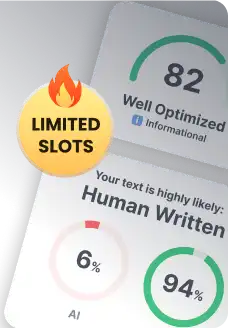The SEO landscape is rapidly evolving, and AI is at the forefront of this transformation. By harnessing the power of machine learning, AI-powered SEO tools are revolutionizing how we approach everything from keyword research and content optimization to trend analysis and competitor research.
AI in SEO offers unparalleled efficiency, automating tasks and providing data-driven insights that can significantly boost your website’s visibility.
Sophisticated language models are constantly pushing the boundaries of what’s possible in SEO, giving marketers a distinct edge in the competitive digital world. Embrace the power of AI in your SEO strategy, and watch your online presence flourish.
Key Takeaways
- AI in SEO changes the game of search optimization. Automating repetitive processes and increasing precision in keyword research, allows for more effective strategies at an efficient pace.
- AI is also helping us better understand user intent, allowing us to develop more targeted and relevant SEO strategies. This, in turn, improves search rankings and increases user engagement.
- Incorporating AI into SEO workflows offers many benefits—including saving time and improving data analysis and personalized content recommendations.
- AI in SEO is a great opportunity, but there are challenges. There is room for inaccuracies, and human intervention is needed to get the best results.
- Staying competitive in the digital landscape requires balancing AI capabilities with human creativity and judgment, fostering a culture of continuous learning.
- As AI technologies continue to evolve, SEO professionals must adapt their strategies to leverage emerging tools and maintain a competitive edge.
What Is AI in SEO?
Definition of AI in SEO
AI in SEO focuses on using artificial intelligence to enhance search engine optimization. This integration leverages intelligent algorithms and machine learning to analyze keyword data, profoundly impacting search rankings.
AI tools excel at processing vast amounts of information rapidly, unlike traditional SEO practices that rely heavily on manual data analysis. These tools identify actionable insights by recognizing patterns and trends that might be missed by human analysts. This functionality allows companies to make data-driven decisions with greater agility and precision.
AI-driven approaches handle this information with sophistication and nuance, leading to more effective strategies and success metrics. For example, AI can analyze the sentiment of online reviews or social media comments to understand audience perception.
This analysis enables businesses to fine-tune their SEO strategies accordingly. Another crucial aspect is AI’s use in content optimization. By identifying underperforming content, AI tools can recommend updates that improve ranking potential.
Natural Language Processing (NLP) and machine learning algorithms also enable brands to create better content, from long-form articles to social media posts, significantly boosting SEO efforts.
Importance of AI in SEO
In today’s fast-paced digital environment, AI is essential for maintaining a competitive edge. AI in SEO excels at providing tailored content suggestions, and constantly analyzing user behavior to create targeted recommendations that resonate with audiences.
This personalization, combined with user intent, increases engagement and effectiveness. AI tools also enhance scalability, allowing businesses to manage larger, more complex SEO campaigns efficiently.
By automating repetitive tasks like keyword research and A/B testing, AI accelerates processes and improves result precision. AI can determine which keywords to target and which pages are best suited for those keywords, and identify necessary SEO actions to improve rankings.
AI can also locate orphaned pages that are difficult for search engines like Google to discover, improving their ranking potential. Predictive analytics enable companies to determine their next high-value SEO move.
The adoption of AI among SEO professionals is rapidly increasing, with 58% planning to incorporate new generative AI functionalities into their workflows in the coming year. This trend underscores the growing dependence on AI to make SEO practices more efficient and effective across all sectors.
Enhancing SEO with AI
- Content Creation: AI tools leverage NLP and Google SERP data to generate high-quality, SEO-friendly content like blog posts, while automatically adjusting the tone of voice to match your brand or compete effectively. This can save marketers an average of 12.5 hours per week.
- Content Ideation & Optimization: AI keeps content fresh by aligning topics with current search trends and user interests. It also automates content updates and recommends SEO improvements.
- Meta Tag Optimization: AI provides data-driven suggestions for crafting compelling meta tags, optimizing them for targeted keywords to increase click-through rates.
- Keyword Research: AI tools excel at gathering extensive keyword data, including search volume and competition levels, enabling marketers to discover new opportunities and adapt to changing search behavior. A comparative table of different AI keyword research tools can help you choose the best one for your needs.
- Internal Linking: AI analyzes existing content and automatically recommends and creates internal links before publication, improving site navigation and user experience. This process dynamically updates with each new content addition and tracks the impact on SEO performance.
- Backlink Analysis: AI tools evaluate backlink quality and relevance, identify potentially harmful backlinks, and suggest removal strategies. They also track competitor backlink profiles to inform your own strategy.
Benefits and Limitations of AI in SEO
AI is a game-changer for SEO, offering significant benefits such as greater efficiency and enhanced targeting. AI tools can quickly collect and analyze vast datasets, keeping a pulse on customer buying behaviors, market trends, and search engine updates.
This data-driven approach allows for the development of targeted content that resonates with specific audiences. With the help of NLP, captivating content can be crafted that genuinely connects with users. Understanding large datasets, like user behavior or search trends, can reveal new opportunities, such as new keywords or verticals.
Want to try SurgeGraph for free?

Generate 20 documents

SEO tools (Auto Optimizer, Internal Linking, and more)

No credit card required
Advantages of Using AI Tools
AI tools offer substantial benefits by saving time and improving data analysis capabilities. They automate repetitive SEO tasks, reducing the need for manual work. These tools simplify keyword research and uncover new insights from billions of data rows, enabling marketers and SEOs to make informed decisions.
SurgeGraph Vertex, for example, helps generate content that reads like a human and reflects your brand voice while ensuring best SEO practices. This tool integrates trusted, factual information and organically weaves in related keywords, improving content reach. It’s also budget-friendly, offering robust features at a fraction of the cost.
Challenges and Limitations
As with any innovation, AI in SEO has challenges and limitations. Implementing AI tools can be expensive, and integrating them into current infrastructure can be difficult.
Over-reliance on AI without human judgment can lead to poor SEO results. AI can compute the probability of an error, but a balance with human input is crucial. As AI technologies evolve, continuous learning and adaptation are necessary. Keeping up with the latest developments and investing in continued education can help tap into AI’s potential.
Finding the right balance between AI capabilities and human expertise is key. AI enhances learning potential, but human oversight ensures content remains authentic and aligned with strategic goals.
One study showed that AI-generated content with human oversight suffered only a 6% drop in traffic and a small decrease in SERP rankings, highlighting the importance of this equilibrium.
Popular AI Tools for SEO Optimization
In the fast-paced world of digital marketing, these popular AI tools for SEO optimization have changed the game. Let’s delve into some of the most popular AI tools available, exploring their features, pricing, and suitability for different user levels.
Tool for Content Generation
AI tools like SE Ranking and SurgeGraph Vertex are designed for producing high-quality, SEO-optimized content. They assist in creating various types of content, from informative blogs to engaging social media posts, while maintaining brand voice and style consistency.
These tools ensure that your content resonates with your audience by employing unique writing styles and conversational tones that feel human, making them ideal for marketers and agencies aiming to produce compelling content at scale.
Tool for On-Page Optimization
AI tools like SurgeGraph Vertex are excellent for optimizing on-page elements, including headings, images, and keyword placement.
Through detailed analysis of competitors’ pages, they develop unique insights that optimize content structure to improve user experience and search engine crawling. This ensures that your content is accessible to both users and search engines, increasing visibility and engagement.
Tool for Local SEO Enhancement
Third-party tools like Indexsy focus on local SEO, improving visibility in local search results with features like citation management and local keyword tracking. Local SEO is crucial for businesses targeting specific geographic areas. Whether you’re new to the field or a well-established enterprise, these tools can enhance your local visibility.
Best Practices for Implementing AI in SEO
Adopting AI as a core part of your SEO processes offers invaluable advantages, increasing both efficiency and creativity. To maximize AI’s potential in SEO, consider the following best practices:
- Set clear objectives for AI implementation.
- Balance human creativity with AI efficiency.
- Regularly monitor performance metrics and adjust strategies accordingly.
Set Clear Objectives
When implementing AI into your SEO strategy, having clear goals is essential. AI tools offer remarkable insights and capabilities, but without a clear direction, their full potential may not be realized.
Want to try SurgeGraph for free?

Generate 20 documents

SEO tools (Auto Optimizer, Internal Linking, and more)

No credit card required
For instance, set a goal to boost organic search traffic by 20% in the next six months. Ensure your goals are quantifiable and aligned with broader business objectives so that your AI initiatives have measurable impacts on organizational success.
Communicate these objectives clearly to every team member involved in the SEO process to keep the team aligned and focused, allowing for measurable success and adjustments as needed.
Balance Human and AI Efforts
While AI enhances efficiency, there is no substitute for the human touch. Fostering a complementary relationship between AI solutions and human SEO professionals will yield the most effective outcomes.
AI boosts productivity in areas like keyword research and data analysis, but human input is critical for interpreting insights and formulating strategic decisions. AI can quickly provide a comprehensive keyword list, but an experienced SEO professional will select the keywords that best fit the brand’s voice and audience.
Cultivating an environment of ongoing education is key to maximizing the potential of AI tools with human ingenuity. This strategy enables teams to stay current with the latest tech trends while placing the human touch at the center of content creation and strategy development.
Monitor and Adjust Strategies
Continuously monitoring the effectiveness of AI-powered SEO tactics is essential. Using analytics tools, marketers can gain clear insights into how their AI integrations are performing.
This continuous process enables data-driven adjustments, ensuring SEO strategies are optimized according to performance metrics. When AI tools indicate that certain keywords are underperforming, the approach can be adjusted in real time, focusing efforts on more promising areas.
Being adaptable to new algorithm updates or user behaviors is crucial. AI tools save time—marketers report saving an average of 12.5 hours per week—but human oversight ensures that strategies remain effective and accurate.
Frequently Asked Questions
What Is AI in SEO?
AI in SEO is the practice of leveraging artificial intelligence to make smarter SEO strategies. These tools and features help you improve your content creation, keyword research, and competitive analysis.
How Does AI Enhance SEO?
SEO AI helps marketers automate data analysis processes, create optimized content for the most relevant keywords, and maximize user experience across platforms. It helps make SEO efforts more strategic and efficient.
What Are the Benefits of Using AI in SEO?
AI is effective in saving time, increasing accuracy, and creating more relevant content. It also arms marketers with data-driven insights to inform better decision-making and improves website performance in search rankings.
What Are the Limitations of AI in SEO?
AI doesn’t understand the human creativity and intent behind nuanced content. It also has a hard time understanding context and needs constant retraining to remain effective with search engine algorithm updates.
What Are the Best Practices for Implementing AI in SEO?
Ensure you begin with defined objectives, select the appropriate technologies, and continually iterate on your approach. Continuously track results and be prepared to adjust to changes in search engine algorithms to keep your campaign performing at its best.





